Last Updated on September 29, 2022
It is common knowledge that internal combustion engines generate a lot of heat as they operate. In normal situations, there are two ways in which a car engine cools down while it is running.
The main way is from being exposed to coolant fluid, also known as antifreeze. This fluid is formulated to regulate the temperature of the engine so that it does not get too hot. Furthermore, it helps prevent scales and corrosion in the engine as well.
The second way an engine cools down is from the oil that flows through it. This oil serves as a lubricant for the hot engine components but also serves as another coolant as well. As long as you have enough coolant and oil flowing in your vehicle, you should never need to worry about your engine overheating.
However, there are so many problems that could arise which might compromise these cooling liquids. You could have a leak or damaged component in any number of places that could result in your engine overheating. It is not a good idea to drive for too long with an overheated engine or else there could be irreversible damage caused to it.
Related: Can You Add Water to Your Radiator in an Emergency?
6 Common Causes of Engine Overheating
Below are the top 6 causes of an overheated engine. Once you understand these common causes, you will know where to look so that you can fix the cause of the problem right away. It is better to do this sooner rather than later or else your engine might never function the same again.
#1 – Coolant Leak

Your engine depends on coolant to stay cool as it is running. There is an entire cooling system which keeps the coolant flowing smoothly. You have a water pump, radiator, thermostat, hoses, and a head gasket that make this all happen.
If any of these components gets damaged or worn out, they might leak coolant out from them. This will result in an overheated engine. If the leak is small, you might be able to temporarily patch it up until you have time to bring your vehicle to the shop and replace that component.
#2 – Clogged Hoses
If your engine is overheating but there is no coolant leak, then you might have a clogged coolant hose. This might happen if sediment or dirt from the road inadvertently got into the hose. This will block the coolant fluid from being able to flow through the system properly.
Telltale signs of this are a cold lower radiator hose and/or cool upper hose.
Read Also: 3 Symptoms of a Clogged Heater Core
#3 – Bad Water Pump
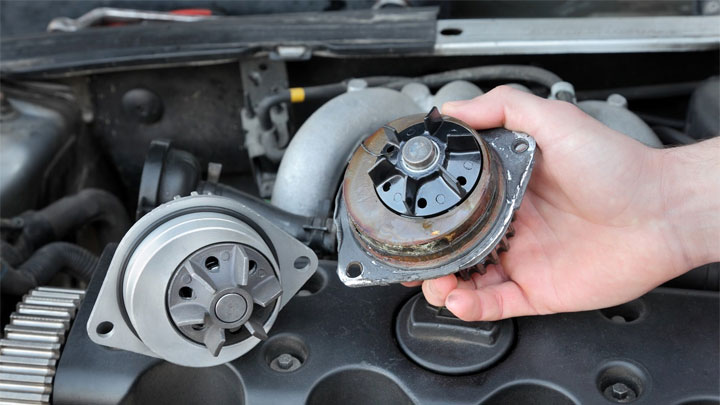
The water pump is the component which propels the coolant fluid so that it can flow in the cooling system. If the water pump is damaged or worn out, your engine will overheat from it. Check the impeller vanes or bump shaft because these are commonly the reasons for the water pump going bad. There may even be leaks too.
#4 – Faulty Radiator
The radiator is what transfers heat out of the hot coolant so that it can cycle back into the engine and cool it down again. If you have a bad radiator, the coolant liquid is going to stay hot. This means the engine is going to stay hot as well.
Sometimes a radiator might have a broken fan which prevents the hot air from escaping. Other times, there are leaks or clogs in the radiator or even a faulty radiator cap. All this leads to an overheated engine.
#5 – Wrong Coolant
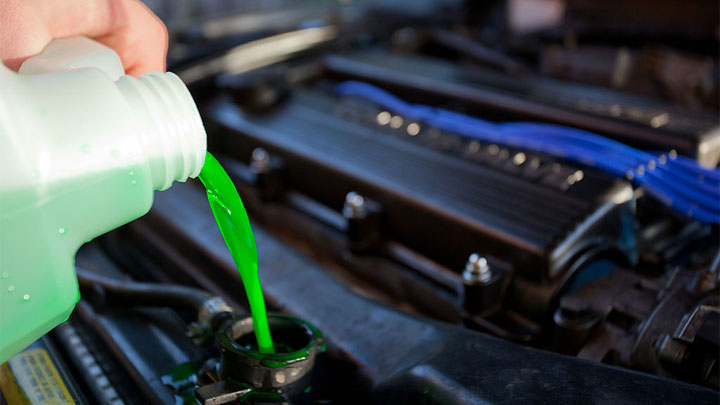
You might not see any leaks or faulty components at all, but still notice your engine overheating. If you put new coolant fluid in your vehicle recently, then perhaps you used the wrong cooling fluid.
The best thing you can do is flush your entire cooling system and then add the right cooling fluid back into the system.
Related: Different Types of Coolant (and Their Colors)
#6 – Low Engine Oil
As stated earlier, motor not only acts as a lubricant between the moving components inside an engine, it acts keeps internal temperatures at bay.
If your engine has too low of an amount of oil (or old oil that’s deteriorated enough), excess friction will be the result which drastically raises the engine temperature. This can ultimately result in overheating and internal engine damage.
5 Common Symptoms of Engine Overheating
Below are the top 5 symptoms of an overheated engine. If you notice at least a few of these symptoms present in your vehicle, then you should act fast and resolve the issue before it is too late.
#1 – Temperature Gauge is Red
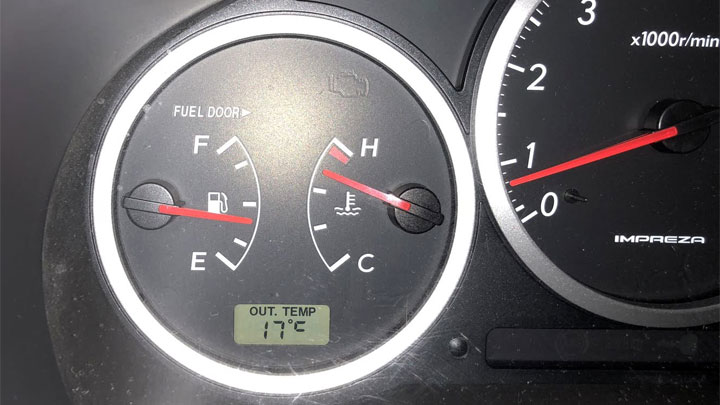
Your vehicle should have a temperature gauge on the dashboard. This gauge is supposed to tell you the temperature of the engine.
In normal situations, the needle of the gauge will be in the black area. This indicates a normal temperature. But if the needle is in the red area, this indicates that you have an overheated engine.
See Also: Why Is My Temperature Gauge Rising But the Car Is Not Overheating?
#2 – Steaming Hood
As the engine gets hotter, steam will emit from the hood of your car. This can be attributed to the hot coolant.
If you have a faulty radiator and the coolant isn’t able to cool down, then it will start to boil. This boiling coolant will cause steam to come out of it.
#3 – Temperature Light

A lot of people don’t pay attention to their temperature gauge unless something motivates them to do so. That is why your temperature light will illuminate on the dashboard whenever your engine is starting to overheat.
You can then verify this problem by simply looking at your temperature gauge. If the needle is close to red, then you have your confirmation of the problem.
Read also: Faulty Coolant Temp Sensor Symptoms and Code P0118
#4 – Burning Smell
An engine contains many components made of different materials, such as metal, rubber, and plastic. Once the engine overheat, all these materials will burn. In addition, they will emit a very distinct burning odor that can be smelled throughout the entire passenger cabin.
The oil will also burn and create a smell too. If you smell anything like this, then you know your engine is overheated.
See Also: Symptoms of Burnt Transmission Fluid
#5 – Poor Engine Performance

An overheated engine will not be able to function properly on the road. If you try to demand more power from an overheated engine, you won’t get it. The acceleration will be weak at best, and all the other symptoms listed above will be present.

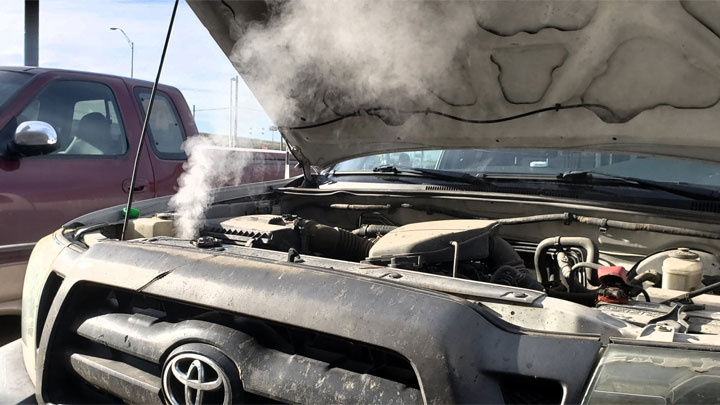
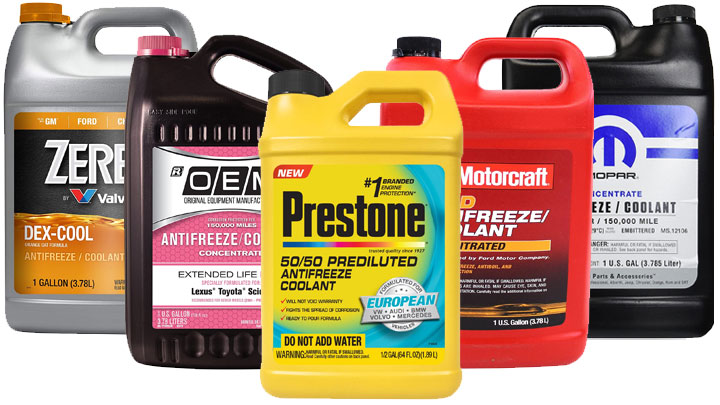

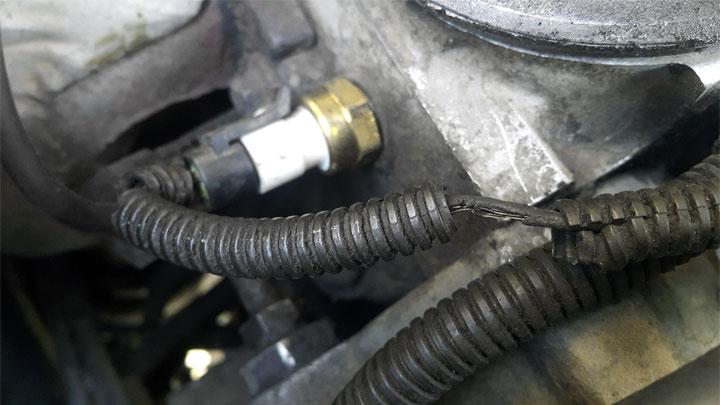
I have had engine overheating after flushing out the radiator,still I notice steaming hood,even when two fans attached to the radiator are in good working conditions.what could be the faults.
Make sure to bleed all the air out of the system any time you flush the radiator. Air pockets in the cooling system can often cause overheating issues. Some vehicles have a bleed valve to accomplish this, usually when the radiator filler neck is not the highest part of the cooling system.
If you’ve never done this before, look up a few guides online for the proper way to bleed your specific cooling system so you don’t risk burning yourself.
My car doesn’t start, they say it has low compression, they say i must take it to the engineers (Renault Megan 1.6)
Why is my car making a gurgling sound when started
This is a common symptom of air in the heater core. You could try bleeding the air out of the cooling system, but I would also consider doing a leak down test to confirm if you have a head gasket leak.
Vw golf 2 litre. Engine heat’s up after every small trip and pushes out about 2 litre of water from the reservoir. I got the fan on direct using a switch. Still pushes out water After researching a bit. It seems like faulty thermostat
I would do a leak down test to see if perhaps it is a head gasket leak.
I have been experiencing oil switch indicator flash light once my temp indicator rises up to 90 degrees and above, I just changed oil pump last 6 months ago due to the same oil switch lamp. This time the engine engine is experiencing difficulty in movement at 97 degrees centigrade. My vehicle is Opel 92 model with single injection fuel system.8 valves.Thanks.
Have you done an oil pressure test on the vehicle when it reaches that temperature?
My car is old but she has done me well the past 5 years, but the last 6 months I’ve been having issues where im having to fill my water every other day. Due to over heating it’s been serviced regularly has oil coolant all my heaters are blowing out cold air. Not to sure what to do?
Check to make sure you have no leaks in the cooling system. White streaks mean coolant is probably leaking near that location.
It may be worthwhile to do a leak down test. After overheating the vehicle, it is possible there is further engine damage. This could be a blown head gasket, warped heads, or a cracked block. A leak down test will tell you if you are losing compression through the cooling system or some other location.
My cars check engine light came on today. My car started to jerk and i noticed my car was running hot l. I got my oil changed when it happened. I got coolant and put some in my car because I noticed it was super low. My car is still running hot and jerking and I have no idea what the problem is I’ve experienced almost all of the things listed above
They also put my car on the computer at advance auto parts and it just told me something about my coolant system and he told me to buy coolant
Since your coolant was low, it’s possible you still have some air in the cooling system. I would get the cooling system bled of air and see if the problem persists. After bleeding the cooling system, check your coolant regularly. Top it up until your coolant level is at the full line.